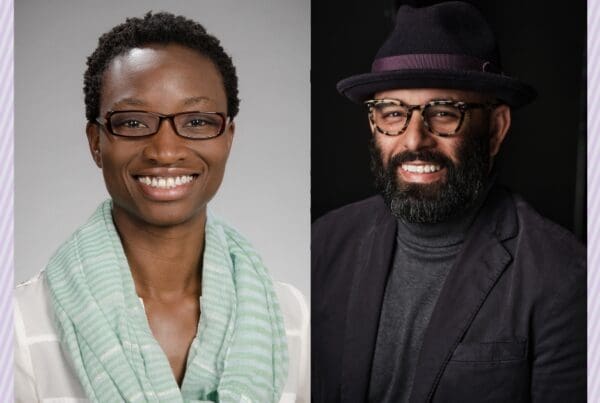Highlights | A commitment to uplifting healthcare workers
- The Center for Health Workforce Studies supports healthcare workers by bringing to light the barriers and opportunities for workers to grow and feel secure in their roles.
- The Center uses its research to help healthcare leaders and policymakers, as well as the workers themselves, identify the potential for long-term healthcare careers.
- A focus on improving diversity and wages is part of what the Center believes is necessary to create an equitable environment.
Supporting healthcare workers starts much sooner than the moment they step into the clinic. The Center for Health Workforce Studies at UW Medicine knows this. It has become a critical source of information for effective advocacy for people who work in healthcare. Based in the Department of Family Medicine at the UW School of Medicine, the Center strives to elevate the importance of workers in healthcare policy discussions.
In addition, it is a valuable resource to the UW Medicine community, as it looks to help healthcare leaders understand who takes on healthcare jobs and how to break the barriers that could prevent them from receiving the guidance they may need to grow within the field.
What is the Center for Health Workforce Studies?
The Center for Health Workforce Studies is responsible for researching who works in healthcare, their roles, and what obstacles could block someone from coming into the healthcare space. The Center houses two of nine Health Workforce Research Centers, which look to understand the needs of the health workforce across the U.S. It is funded by the National Center for Health Workforce Analysis of the Health Resources and Services Administration to address the allied health workforce and healthcare workers’ role in addressing health equity and health workforce diversity.
It also provides consultation to local, state, regional and national policymakers on health workforce issues and develops and refines analytical methods to support health workforce planning.
The Center focuses on all members who work in healthcare, not just those working in direct patient care.
“Much of what happens in this field to date has had a heavy focus on physicians and nurses,” says the Center’s director, Bianca Frogner, PhD.
“They’re the most visible and have the most influence on how healthcare is delivered. But there are many jobs in healthcare, and the first step is to identify the different occupations and education levels that are needed to get into those jobs.”
Through achieving the goal of identifying and understanding the different roles within the healthcare space, the Center has explored how well those who are entering into healthcare are connecting with the right resources to continue on their desired career path.
“We use both secondary data and collect primary data to see how people move up the career ladder within healthcare,” says Frogner.
Frogner adds that the Center uses several public data sets to gain insight into people’s movements within the field over time.
Active research areas of the Center for Health Workforce Studies
Frogner says that research and policy discussions to date have largely focused on the recruitment of healthcare workers, but would like to see more focus on ideas for retention of workers.
“We try to bring to light the opportunities to help people grow within their healthcare career,” says Frogner. “In community health centers, they’ve adopted an apprenticeship model that trains those not currently in healthcare jobs to succeed within a healthcare position such as a medical assistant. You don’t just get training on the job, but you also get paid while doing the training and possibly get college credit so you can build toward a degree.”
Using the information collected to pave clear pathways in healthcare, the Center hopes to improve efforts around team-based care. Understanding what a team dynamic looks like and learning how to be productive can sometimes be an elusive concept within the space.
“The reality of healthcare is that it’s delivered in a team,” Frogner says.
And a team of healthcare workers is not only influenced by the workers’ skills, but also by the diversity within the team. Many patients ask for a specific type of provider, whether that’s specified by race, gender or a different kind of identifier. The Center is exploring ways that their research can inform healthcare teams on how to develop a diverse and well-rounded team of providers.
“Other important elements to building a strong team are helping team members develop skills around cultural humility and creating an inclusive work environment,” Frogner adds.
Supporting healthcare workers’ wages
The conversation around wages has been an important topic.
Healthcare is an industry constrained by insurance restrictions, which can impact the price of care and thus the amount a worker will be paid. Frogner explains that healthcare workers are feeling underpaid and undervalued for their hard work during the pandemic, so the Center is working to help address those concerns.
“We need to do better to see how we can take care of the workers. In addition to considering raising wages, could we offer childcare, paid sick leave or other things to show that we value their work? We have been examining the extent to which healthcare workers receive these important benefits, and those in aide and assistant level jobs are less likely to receive these benefits,” says Frogner.
The future of the Center for Health Workforce Studies
The Center hopes to highlight the many job opportunities in the healthcare industry.
“When recruiting people, we need to think about exposing younger people to all the different areas of healthcare earlier on in their career. Identifying these job opportunities at a younger age is important as well,” says Frogner.
Helping healthcare workers build a clear career path and ensure they are supported in their goals, will ultimately help the workers meet their current and future needs.
To do this work, Frogner says that there is a need for more conversation across professions. “We have a tendency in medicine to be siloed, and I am lucky to lead a team that works across multiple professions because that’s how we’ll make change. We need to work across the aisle, especially at a time when things can be divided. We can’t accomplish good patient care within these silos.”
The future of medicine begins now, by listening to and supporting current healthcare workers, and carving the way for new workers. The Center hopes to continue to make these voices heard.


